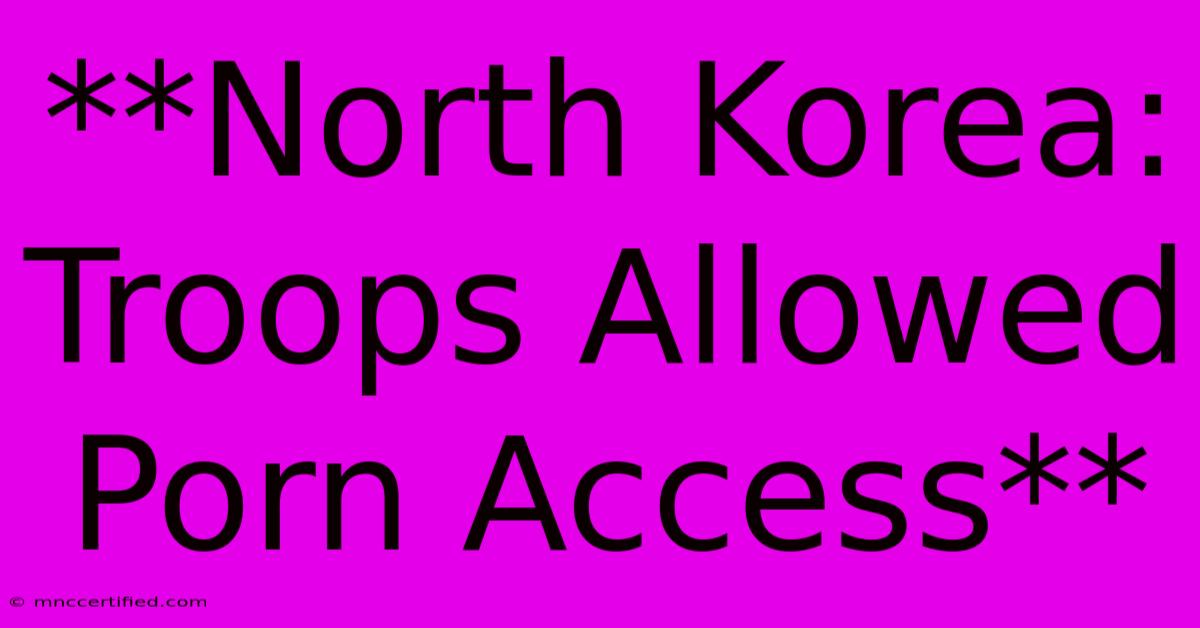**North Korea: Troops Allowed Porn Access**

Table of Contents
North Korea: Troops Allowed Porn Access? Fact or Fiction?
The internet is buzzing with claims that North Korean troops are being allowed access to pornography. This shocking revelation has sparked widespread interest, but is it true? Let's delve into the details to separate fact from fiction.
The Rumors and Speculation
The initial claims surfaced on various online platforms, alleging that North Korean soldiers have been granted access to pornographic websites as a form of relaxation and stress relief. These claims were further fueled by the purported discovery of "pornographic USB drives" confiscated from soldiers. However, credible evidence to support these claims remains elusive.
Dissecting the Evidence
While the idea of North Korean soldiers accessing pornography seems outlandish given the country's strict censorship laws, it's important to be critical of the information we consume.
- Lack of Reliable Sources: The initial reports lacked reliable sources. Reputable news outlets or independent organizations haven't corroborated these claims.
- Misinformation and Propaganda: North Korea's closed nature and stringent controls over information flow make it fertile ground for misinformation and propaganda. It's crucial to evaluate information from multiple, independent sources before reaching any conclusions.
- Potential for Misinterpretation: The discovery of USB drives containing pornographic content could be misconstrued. It's unclear if the drives were intended for soldiers or if they were part of a broader crackdown on illegal materials.
The Reality of North Korea's Information Control
North Korea operates under a highly restrictive information control regime. Access to the internet is tightly controlled, with citizens only granted access to a heavily censored intranet. The government strictly monitors and filters all information, and any form of dissent or unauthorized access to information is met with harsh consequences.
What Does This Tell Us?
The claims about North Korean troops accessing pornography are likely exaggerated or false. The stringent nature of North Korea's information control system makes it highly unlikely that soldiers would be granted access to such materials.
Moving Forward: A Reminder on Critical Thinking
The internet is a powerful tool for spreading information, but it's also susceptible to misinformation and rumors. When encountering shocking claims, particularly about a highly secretive country like North Korea, it's crucial to exercise critical thinking:
- Verify Information: Check multiple sources, especially reputable news organizations and independent fact-checking websites.
- Consider the Source: Evaluate the credibility of the source. Is it known for biased reporting or spreading misinformation?
- Be Skeptical: Approach sensational claims with skepticism. Don't jump to conclusions without sufficient evidence.
By practicing critical thinking and relying on verified information, we can navigate the complex landscape of online information and prevent the spread of misinformation.

Thank you for visiting our website wich cover about **North Korea: Troops Allowed Porn Access**. We hope the information provided has been useful to you. Feel free to contact us if you have any questions or need further assistance. See you next time and dont miss to bookmark.
Featured Posts
-
Chelseas 20 Minute Domination All Goals
Nov 08, 2024
-
Us Pentagon On North Korean Troops In Russia
Nov 08, 2024
-
Outer Banks Season 5 What We Know So Far
Nov 08, 2024
-
Ashley Jensen Overcoming Tragedy Embracing New
Nov 08, 2024
-
Westbrooks Presence Makes An Immediate Impact On Nuggets
Nov 08, 2024